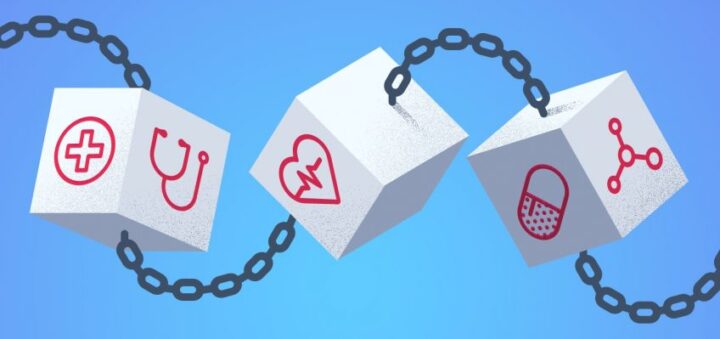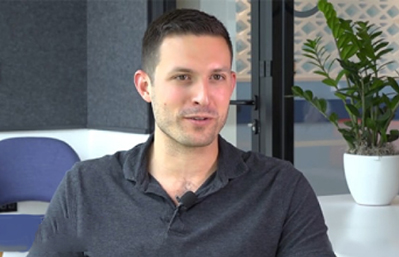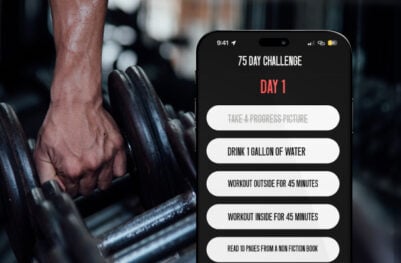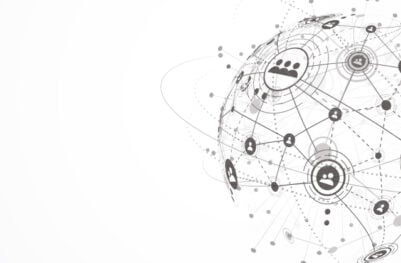- Developers
- Developer Blog
- Blockchain Development
- Blockchain in Healthcare

profile

By Aran Davies
Verified Expert
8 years of experience
Aran Davies is a full-stack software development engineer and tech writer with experience in Web and Mobile technologies. He is a tech nomad and has seen it all.
Here are some of the main examples of blockchain in healthcare use cases. The examples represent both the areas of healthcare where the largest amount of investment in blockchain has been made and also where the systems have best delivered on the promise of blockchain.
Uses of blockchain in healthcare
Health records
Electronic health records (EHRs) have been a promise of IT since the early days of the integrated healthcare computer system. Despite this, a huge number of patient records throughout the globe still only exist on paper.
The main drawback to this system is the danger of destruction by fire and the time it takes to transfer a patient’s records to his/her new doctor. In an emergency, this could even prove fatal if a patient’s medical history is not known to a doctor in an emergency. Should a patient be unconscious and suffer from a reaction to a certain drug, for example, a doctor would not know prior to administering the drug.
Blockchain-based electronic health records would allow records to be easily sent from one location to another making them, in effect, the first-ever anywhere anytime electronic medical record. The potential of these kinds of records to transform patient care is enormous.
They could even be linked to devices such as smartwatches to provide real-time monitoring of a patient’s health. So, if for example, a patient with a heart condition exercises too strenuously, the device would be able to warn him/her based on the information/recommendations held in his/her health record.
Drug Supply
Blockchain-based smart contract technology can also revolutionize the entire way that health organizations cope with ordering and distributing drugs. Smart contracts, where both parties agree to a digital contract that is then in force until a set of agreed-upon factors are met, would be able to underwrite many of the transactions that the world’s health organizations currently undertake.
If smart contracts were implemented in the way that healthcare organization’s order drugs from suppliers, not only would the process be more secure but it these contracts would also allow payments to be automated upon delivery. This would help to reduce the pressure on already overburdened and often understaffed accountancy departments. Another advantage of smart contracts is the degree of traceability that they offer.
Hire expert developers for your next project
Since these contracts could be set to require drug shipments to be recorded at each step of their journey, it would only take a matter of seconds to trace missing orders. Such technology also helps protect against fraudulent drugs and also with drug recalls.
On the other end of the process, blockchain-based smart contracts could facilitate the issue and fulfillment of prescriptions between doctors and pharmacies. Since these prescription contracts would need to be signed for by all parties, a doctor could sign one before issuing it to the patient.
The patient could then go to a nearby pharmacy who would then sign the contract upon issuing the drugs. This would complete the process and allow the prescription contract to be closed.
Another huge advantage of this system is that one portion of the requirements upon completion of the smart contract could be an update of the electronic medical record of the patient in question, which would allow doctors to keep an eye on exactly how many drugs a patent is using over a given time span.
The MediLedger Project is a company founded in 2017 which aims to bring together healthcare organizations with various suppliers. It operates a track-and-trace process for prescription medicine. While the project is yet to be implemented into the real-world healthcare environment, it is being developed to fill this gap in the market. It hopes to launch the first-ever commercial version sometime in late 2018.
Clinical trials
Clinical trials stand to benefit from blockchain-based smart contracts too. While blockchain technology would allow for patients’ medical data, trial result data, and drug formulas to be sent securely, it could also help prevent organizations from recording fraudulent data or attempting to modify existing data relating to clinical trials.
Blockchain technology is able to do this because once a block in the chain is written it cannot be altered retroactively. Therefore once data has been recorded into the blockchain it cannot be altered at a later stage. This would allow government health organizations to speed up approval of new drugs as they wouldn’t need to assess the authenticity of the data beyond the original record, and since the blockchain would record the time and person recording the data, the likelihood that they would agree to enter fraudulent data is practically nonexistent.
One way that blockchain technology stands to revolutionize the development of new drugs is through precision medicine. Due to the security benefits that allow data to be created, transferred, and accessed, patient medical data could be used alongside real-time data derived from smart devices to create massive pools of big data relating to the effects of new drugs.
Hire expert developers for your next project
1,200 top developers
us since 2016
Since a great deal of the feedback could be in real-time, doctors could monitor the health of their patients and even help in the development of new drugs. Such is the power of technology used in this way that it could even allow for designer drugs that are refined according to not just amount, but chemical makeup as well.
Claims adjudication
The insurance industry stands to benefit enormously from the use of blockchain technology. While insurers can use it for helping to detect fraud, another way it will benefit is from using blockchain to help streamline the way it handles claims.
Currently, it takes between 90 and 180 days from the time that a health claim is initiated until payment is made to a healthcare company. Not only is this mean that these organizations are owed enormous sums of money at any one time but it also shows just how inefficient the current system is.
The use of smart contracts could dramatically speed the process up and massively reduce the number of people-hours that are required as well. Smart contract based healthcare claims processing, such as the service offered by Dokchain, connect patients and insurance providers through legally binding smart contracts.
So once a contract is initiated by both parties and paid for by the patient, each time the patient receives any kind of medical treatment the service will be added to the blockchain. Provided the treatment and various other agreed criteria then the contract will initiate a payment process whereby the insurer automatically pays the amount due.
When considering how much time this will save an insurance company processing this single claim, just imagine how much time and money will be saved processing the estimated 3 billion healthcare insurance claims made each year.
The wonderful thing about smart contract technology is that it is getting better with each passing day. In the future smart contract software will become increasingly complex, allowing an ever-increasing number of factors, data, and actions to be built in.
Hire expert developers for your next project
Also as blockchain technologies are integrated with big data analytics, smart devices, and internet of things (IoT), the ability of healthcare companies to not just process claims but to improve their entire business model and the type of insurance they offer will be truly revolutionary.
It is possible that one day, an insurance claim will be activated from the data received from the smart devices a person is wearing, which would trigger the initiation of a sophisticated smart contract that would literally call an ambulance for a person in trouble, notify whichever hospital the person was eligible to receive treatment from, and continue to handle the entire process including the update of the person’s medical records in real-time.
The benefits to the hospitals would be streamlining of the administration staff in favor of more doctors and more nurses. This would dramatically improve patient care for a number of reasons.
Firstly, doctors and nurses would not need to be overworked and so would be less likely to make mistakes. Secondly, doctors could also be able to spend more time with patients, something which will not only help make their stay a better one but may even trigger the ’homeopathy effect’ where patients respond to attention in a way that makes them believe their condition has improved.
Frequently Asked Questions
Blockchain is a database technology that runs on decentralized networks of computers or nodes. It facilitates the creation of data entries or blocks which are all linked to the previous and subsequent block.
Blockchain solutions are being developed to help replace a number of existing software solutions. Examples include blockchain-based medical records, supply chains, and prescription reorder solutions.
Smart contracts will be used to allow for better automation of existing processes. Examples of this include drug supply chains which will see a reduction in the need for human oversight by smart contract automation.

Alexey Semeney
Founder of DevTeam.Space
Hire Alexey and His Team
To Build a Great Product
Alexey is the founder of DevTeam.Space. He is award nominee among TOP 26 mentors of FI's 'Global Startup Mentor Awards'.
Hire Expert Developers




